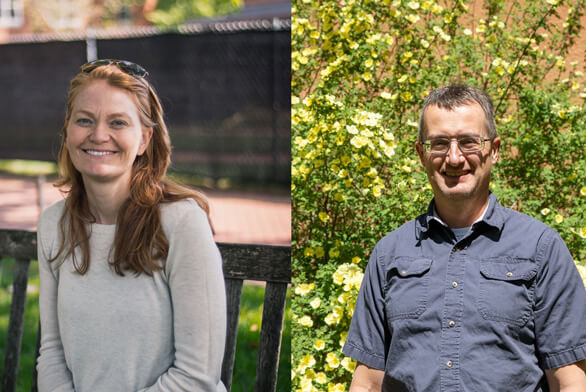Summer Classics: A Beautiful Opacity
August 23, 2022 | By Eve Tolpa

Boccaccio’s The Decameron is a collection of one hundred stories that chronicle the whims of fortune and vicissitudes of love. Set in 1348 in a country villa outside of Florence, it features a group of ten young people trading narratives while taking refuge during the aftermath of a plague.
To be sure, the book’s theme has a particular resonance in light of our collective relationship to the ongoing COVID-19 pandemic. But that’s not the primary reason Santa Fe tutor Ken Wolfe (SF94) chose it as a featured text for the 2022 session of St. John’s Summer Classics.
The Decameron is also the first major work of prose literature produced in Italy, a country to which Wolfe has a strong personal connection; he completed both a master’s degree in Latin and a PhD in classics from UC Berkeley. “I’ve had a really long-standing interest in the Mediterranean world, not just the ancient one,” he says. “I know Italy, and I love the food, the sound of the language and the music—everything.”
Wolfe initially read The Decameron during spring break of his junior year at St. John’s. “It was just on my own,” he says. “I didn’t have a chance to have Johnniestyle discussions on the book, but I really got into it and found it delightful.”
He began to revisit it last fall and asked Annapolis tutor Leah Lasell (SFGI04) to join him in co-facilitating a Summer Classics seminar on the text. The two had known each other for years and had previously worked together on a collegewide committee. By his own count, Wolfe has facilitated four or five Summer Classics seminars in the past, leading discussions on topics ranging from Darwinian theory to Persian poetry. For the 2022 session, he not only collaborated in person with Lasell to discuss The Decameron but also teamed up with Annapolis tutor Allison DeWitt for an online seminar, “Reading the Qur’an as Literature.”
This is the first Summer Classics experience for Lasell, who shares Wolfe’s interest in the geographical region and culture of Boccaccio. “I have a grant to study Galileo this year and next year, so I’ve been working on Italian science and philosophy,” she says.
Unsurprisingly, there are a number of factors that might draw tutors to a particular text or work of art for Summer Classics. It could be the appeal of revisiting a Program text with a fresh group of readers or the allure of exploring something new—including films, opera, paintings, or photographs. Sometimes it’s simply committing to a book that has sat for too long on a shelf, untouched, as was the case with Lasell and The Decameron.
Of course, the plague theme did play into the two tutors’ choice of text, too.
Says Wolfe of the pandemic, “It’s been a really difficult time for a lot of people in terms of isolation. You might be isolated alone, or you might be isolated with family members, and both situations will have their challenges.”
The Decameron can provide an antidote of sorts to that difficulty. “It’s a really fun book,” Lasell says. “A lot of the stories are based on pleasure. There’s sort of an interesting interplay between what’s allowed, with respect to the state and religion, and how people are trying to find pleasure in the crevices there.”
In general, she finds that a text that engenders fruitful discussions is one that can be approached by readers from a variety of backgrounds and experiences, which is also the ideal profile of a Summer Classics seminar group.
Whether they are alumni, lifelong learners, or (as is the case with Lasell’s mother, who registered for the 2022 session) people with a strong personal connection to the college, Summer Classics attendees are immediately immersed in the culture and conventions of a Great Books seminar.
“We do have a lot of repeat participants, and newcomers can learn from people who have done it in the past,” says Wolfe. “They all bring a lot of energy and enthusiasm and freshness to the conversations.”
The desire to connect through ideas is central to a St. John’s education and, some would argue, a defining characteristic of our shared humanity. For Lasell, this notion was reinforced by a story she heard on public radio some years back.
In an interview, an Afghani man spoke of being middle-aged in a war-torn country and recalled how groups of people would get together to read Shakespeare.
“It would have been impossible to talk about war directly and about how it affected their lives—it was just too raw,” says Lasell. “But somehow talking about Shakespeare gave them the opacity that they needed to think about their life without thinking about their life. It created this barrier.”
“When we’re reading Boccaccio, we’re talking about post-plague Italy. It’s as if we are not talking about ourselves at all. That allows us to talk about the things that we might want to talk about, but maybe they are too politically tense. Our emotions get too high when we talk about things directly, so this allows us to talk about them indirectly.”
“That’s what St. John’s does so well,” she adds, referring not just to Summer Classics texts but to the Great Books overall. “It provides us not just some opacity, but a beautiful opaque surface.”

